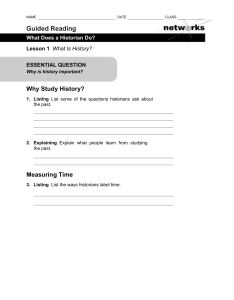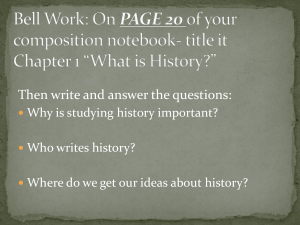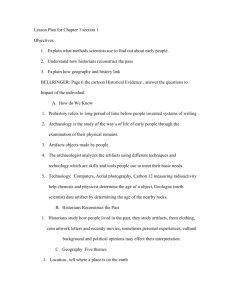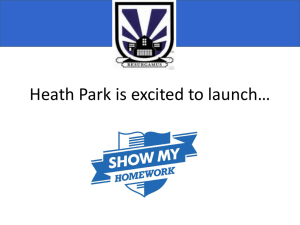File - Greenwood Lakes Social Studies
advertisement
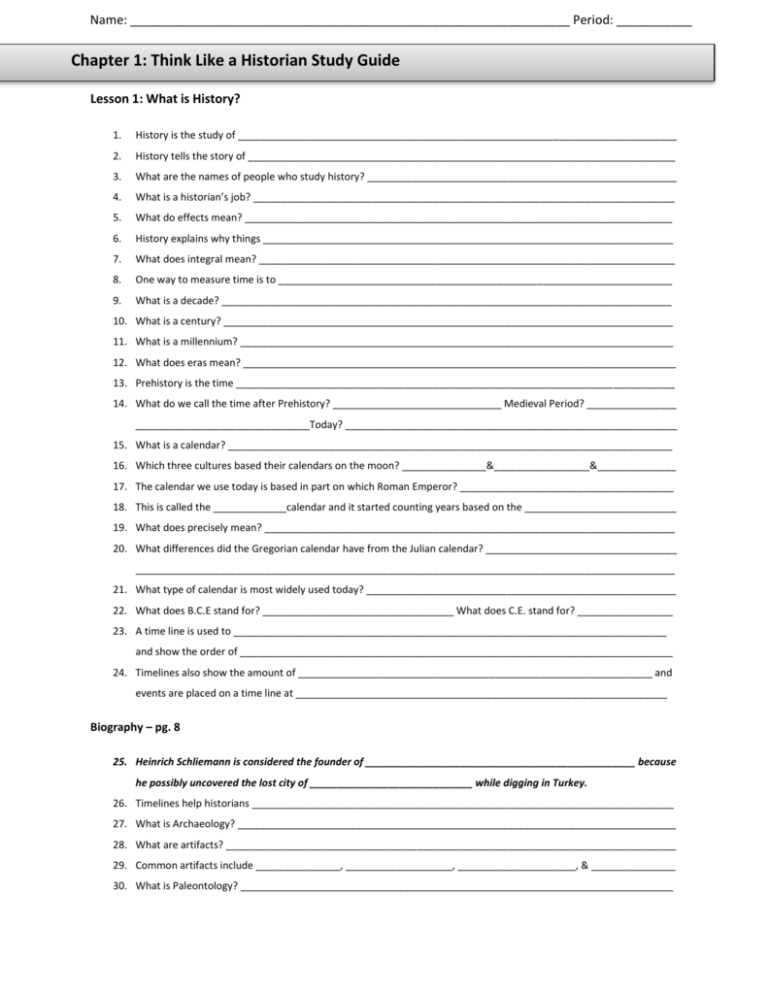
Name: ________________________________________________________________ Period: ___________ Chapter 1: Think Like a Historian Study Guide Lesson 1: What is History? 1. History is the study of ______________________________________________________________________________ 2. History tells the story of ____________________________________________________________________________ 3. What are the names of people who study history? _______________________________________________________ 4. What is a historian’s job? ___________________________________________________________________________ 5. What do effects mean? ____________________________________________________________________________ 6. History explains why things _________________________________________________________________________ 7. What does integral mean? __________________________________________________________________________ 8. One way to measure time is to ______________________________________________________________________ 9. What is a decade? ________________________________________________________________________________ 10. What is a century? ________________________________________________________________________________ 11. What is a millennium? _____________________________________________________________________________ 12. What does eras mean? _____________________________________________________________________________ 13. Prehistory is the time ______________________________________________________________________________ 14. What do we call the time after Prehistory? ______________________________ Medieval Period? ________________ _______________________________Today? ___________________________________________________________ 15. What is a calendar? _______________________________________________________________________________ 16. Which three cultures based their calendars on the moon? _______________&_________________&______________ 17. The calendar we use today is based in part on which Roman Emperor? ______________________________________ 18. This is called the _____________calendar and it started counting years based on the ___________________________ 19. What does precisely mean? _________________________________________________________________________ 20. What differences did the Gregorian calendar have from the Julian calendar? __________________________________ ________________________________________________________________________________________________ 21. What type of calendar is most widely used today? _______________________________________________________ 22. What does B.C.E stand for? __________________________________ What does C.E. stand for? _________________ 23. A time line is used to _____________________________________________________________________________ and show the order of _____________________________________________________________________________ 24. Timelines also show the amount of _______________________________________________________________ and events are placed on a time line at __________________________________________________________________ Biography – pg. 8 25. Heinrich Schliemann is considered the founder of ________________________________________________ because he possibly uncovered the lost city of _____________________________ while digging in Turkey. 26. Timelines help historians ___________________________________________________________________________ 27. What is Archaeology? ______________________________________________________________________________ 28. What are artifacts? ________________________________________________________________________________ 29. Common artifacts include _______________, ___________________, _____________________, & _______________ 30. What is Paleontology? _____________________________________________________________________________ 31. What are fossils? _________________________________________________________________________________ 32. What is Anthropology? _____________________________________________________________________________ 33. Who was Lucy and why was she important? ____________________________________________________________ ________________________________________________________________________________________________ 34. What does species mean? __________________________________________________________________________ Lesson 2: How Does a Historian Work? 1. What is evidence? _________________________________________________________________________________ 2. What are sources? ________________________________________________________________________________ 3. Historians look for clues in what two types of sources? _________________________&_________________________ 4. What are primary sources? _________________________________________________________________________ 5. Primary sources were written or created by ____________________________________________________________ 6. Primary sources can include ______________________&________________________&________________________ &____________________________&_______________________________&________________________________ &______________________________________________&_______________________________________________ 7. Primary sources help historians learn _________________________________________________________________ and they use the sources to _________________________________________________________________________ 8. What are secondary sources? _______________________________________________________________________ 9. Secondary sources are created by ____________________________________________________________________ 10. Four examples of secondary sources are ________________________________&_____________________________ &_________________________________________________&____________________________________________ 11. Why is the Domesday Book a primary source? __________________________________________________________ 12. What is point of view? _____________________________________________________________________________ 13. What is bias? _____________________________________________________________________________________ 14. When historians write about an event, they interpret the information from primary sources to ___________________ ________________________________________________________________________________________________ 15. What is making an inference? _______________________________________________________________________ 16. What does scholarly mean? _________________________________________________________________________ 17. What is historiography? ____________________________________________________________________________ 18. What does finite mean? ____________________________________________________________________________ 19. What are conclusions? _____________________________________________________________________________ 20. What are interpretations? __________________________________________________________________________ Lesson 3: Researching History 1. The first step in history research is ___________________________________________________________________ 2. When choosing a topic, create six questions covering the who, __________________________, _________________, _______________________, _________________________________, ______________________________________ 3. When gathering reference materials, what three reference books are the most likely to be used? ___________________________, _________________________________, __________________________________ 4. Opinion statements in the text might give you a clue that the resource could be _________________&____________ 5. A statement of fact expresses only ___________________________________________________________________ 6. A statement of opinion expresses an attitude and it is a conclusion or judgment about something that ____________ _______________________________________________________________________________________________ 7. Historical research should rely on ___________________________&________________________________________ 8. Why is the information on the internet not necessarily factual or accurate? __________________________________ ________________________________________________________________________________________________ 9. What are credentials? _____________________________________________________________________________ 10. What four types of internet sites are considered reliable? ________________________________________________, _______________________________, ___________________________________, ____________________________ 11. What is an URL? __________________________________________________________________________________ 12. What does .gov stand for? __________________________________________________________________________ 13. What is data? ____________________________________________________________________________________ 14. What does .edu stand for? __________________________________________________________________________ 15. What does .org stand for? __________________________________________________________________________ 16. What does plagiarize mean? ________________________________________________________________________ 17. What does forgery mean? __________________________________________________________________________ 18. What does violate mean? ___________________________________________________________________________ 19. What are copyright laws? ___________________________________________________________________________ 20. To avoid plagiarism, follow these rules: a. ____________________________________________________________________________________________ ____________________________________________________________________________________________ b. ____________________________________________________________________________________________ ____________________________________________________________________________________________ c. ____________________________________________________________________________________________ ____________________________________________________________________________________________ 21. Your evaluations of history should be based on _________________________________________________________ ________________________________________________________________________________________________
